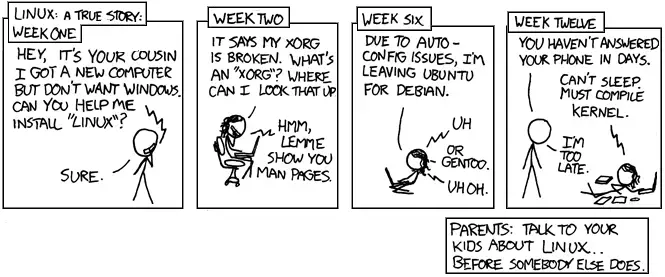I really wish that I was born early so I’ve could witness the early years of Linux. What was it like being there when a kernel was released that would power multiple OSes and, best of all, for free?
I want know about everything: software, hardware, games, early community, etc.
A real pain in the ass. It was still worth it to use for the experience, especially if you had an actual reason to use it. Other than that it was just an exercise in futility most of the time…and I think that’s why we loved it. It was still kinda new. Interesting. And it didn’t spoon feed you. Was quite exhilarating.
Constantly trying to remember obscure bullshit fucking commands
You spent a few evenings downloading a hundred or so 1.44MB floppy imges over a 56kbps modem. You then booted the installer off one of those floppies, selected what software you wanted installed and started feeding your machine the stack of floppies one by one.
Once that was complete you needed to install the Linux boot loader “LiLo” to allow you the boot it (or your other OS) at power on.
All of that would get you to the point where you had a text mode login prompt. To get anything more you needed to gather together a lot of detailed information about your hardware and start configuring software to tell it about it. For example, to get XFree86 running you needed to know
- what graphics chip you had
- how much memory it had
- which clock generator it used
- which RAMDAC was on the board
- what video timings your monitor supported
- the polarity of the sync signals for each graphics mode
This level of detail was needed with every little thing
- how many heads and cylinders do your hard drives have
- which ports and irqs did your soundcard use
- was it sound blaster compatible or some other protocol
- what speeds did your modem support
- does it need any special setup codes
- what protocol did your ISP use over the phone line
- what was the procedure to setup an tear down a network link over it
The advent of PCI and USB made things a lot better. Now things were discoverable, and software could auto-configure itself a lot of the time because there were standard ways to ask for information about what was connected.
Jesus Christ. Glad I got to ride of the backs of the giants before me. Live CD’s were so much fun back around 2001.
I’ve put on a bit of weight since then, but I wouldn’t say that I’m giant.
You brought back traumatic memories I had successfully repressed.
I started using Slackware in the late 90s - say 1998. I used it for most of my desktop applications pretty much right away.
I don’t game much so that wasn’t an issue for me.
It was definitely harder to configure. I recompiled so many kernels and told myself the speed boost from getting exactly what I needed and nothing else was impressive. It wasn’t.
I dunno. It wasn’t as polished as it is now, and was harder to configure, but it was still very good, and once you got it configured, it kept working, unlike the more popular os of the day.
I cut my teeth with DOS and Netware, used Windows until the day 98 was released (had been using the GM for a month), and cut over to Slackware as my daily driver. Dabbled with Redhat before stabilising on Debian, which I’ve never found a need to change from for my headless boxes.
One thing I specifically remember was hand tuning my X11 config to drive my 15” Trinitron at 1024x768 @ ~68Hz.
Linux was exciting but time consuming and not all that useful.
I used to bike into University, spend half the night downloading disk images of SLS, spend hours more installing, and spend hours more getting the X config timings working for my monitor. But when I was finally able to use the same window manager config as the Sun workstations at school I felt like King of the World! But what was I actually doing with it? Xterm and an ancient version of GCC.
That said, I created my own basic Shell in the early days and a few little utilities. So I learned a lot. I do not think I would even have attempted many things without the technical confidence that just being a Linux user brought. There was the feeling that you could do anything even though you were hardly doing anything. And new capabilities were constantly arriving so that feeling lasted years.
It was real real rough
Imagine gnome but instead of deciding your settings for you, they had a dialog where you had to pick the settings yourself.
And you needed to find out the scanlines of your monitor before X would even display anything, and then that was a black and white grid. Then you needed to spent another day or two getting a window manager working.
Oh god, was there even a maximize button so you could maximize your windows?
There was but noone knew what to do with it. We were all universally confused for like a solid 25 years.
What did maximum even mean when you have a “virtual desktop” that was 4x times the size of your actual display. Because that is the kind of nonsense we used to do on Linux (because you you could and the other guys could not).
Relevant xkcd’s



Do you have support for smooth full-screen Flash video yet?
I don’t remember if that ever got fixed. Even if it did, Flash was already on its way out by that point.
Some technologies are better skipped, ignored until they collapse under their own annoyance.
I don’t think this paints a bleak enough picture of Linux before 2010 or so tbh, but it’s a good start.
I think it really depends what you were doing. Some of us wanted to run web servers, and it was really neat that we could easily do so using very old hardware. One thing that is hard to imagine now is that, back in the day, there were not nearly as many configuration files. It was a lot easier to see what was going on, because less was going on.
These days there’s just so much more happening on your system, but at the same time advanced web search has made it possible for us to find better documentation or forums when we need to figure out how to tweak everything.
Plus these days you can just use AI to scan your entire system in detail and explain where everything is while sending that data back to their creator.
Oh wait, sorry, that’s Windows, my bad.
I had an old laptop, and my WiFi required some kind of cutter driver that wrapped broadcom, my Intel graphics didn’t work on newer kernels. It booted in 7 seconds on a 5400rpm disk though while XP took over a minute.
Wifi? imagine trying to get pci modems working and basically compiling your kernel each time you’d need an obscure driver. usb didn’t even exist and external ones were both expensive af and running on serial ports.
good times honestly. I learned so much about linux.
NDIS wrapper. I hated that so much, I bought a natively supported PCMCIA card.
In the late 90s you could get CDROMs from the nerds at university with everything you need on them. If you got your sound card working and could play an mp3, you felt like a master hacker who had beat the game.
I remember kernel panic and dependency hell. But it was also wonderful to get away from win95.
What a lot of people forget is that in the early days of Linux there was no software that targeted it. Everything you would want to run on Linux was intended to run on something else like Solaris, BSD, AT&T Sytem V, SCO, AIX or something else. As a result, Linux APIs were the most generic flavor of Unix possible. Almost every thing meant for a Unix would compile and run on it and there was rarely a dependency problem.
I still miss that.
I didn’t have a Pentium processor in my computer, the internet was young, information wasn’t as ready or available, and the mindset wasn’t that you could check everything. I don’t remember how many floppy disks it took to install Slackware, but at least one read error was definitely on the way. I had a 56k modem at home, so I had printed out the installation instructions from work. Compiling everything wasn’t a problem, because I learned to code back in 1983. When I tried to figure out the refresh rate of my screen, I was afraid I would blow it up and go blind. The feeling of freedom was when you were the one who could choose everything for the first time in your virtual life.
The first time I ever used Linux was in high school around 2001-2002. I don’t remember what the distro was but it had drawing issues, clearly some kind of driver issue that I couldn’t figure out, on my PC so I switched back to Windows 98SE.
Not what op asked for, but it kept away from Linux at home until 2007. I started using Linux regularly in university around 2004.
I had the same issue with Red Hat 6.1 on a cheap PC. One of the reasons I love using Arch is it gives me the nostral of those days.
Games: xbill, koules, and quake1 prerelease test(8 or 16 player multi)
Crafting XFree86 config lines to get a monitor working(no auto-detect for resolution modes)
Sharing tips, on how to solve all these issues, with others at Linux User Groups(LUGs)






